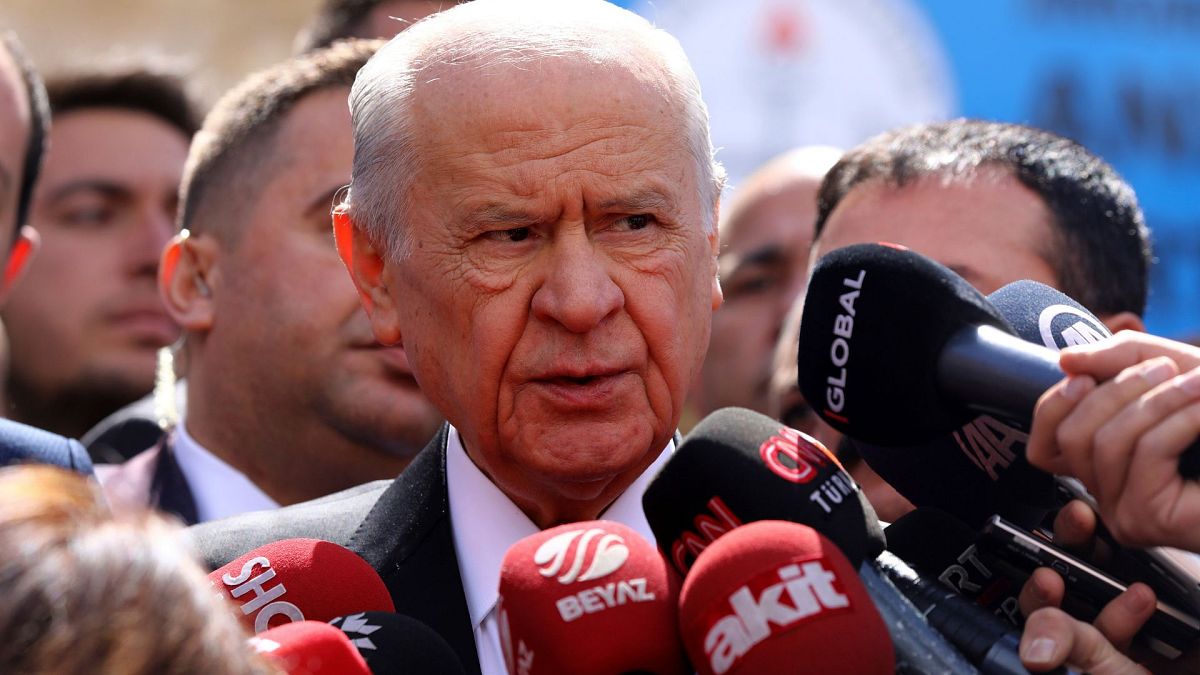Devlet Bahçeli, the leader of Turkey’s far-right Nationalist Movement Party (MHP), has made a surprising suggestion that Abdullah Öcalan, the imprisoned leader of the Kurdish militant group PKK, could be granted parole if he renounces violence and disbands the organization. Bahçeli proposed that Öcalan should declare an end to terrorism and dissolve his organization in order to be considered for parole. This unexpected statement comes as President Recep Tayyip Erdoğan, who is seeking support from the pro-Kurdish Peoples’ Equality and Democracy Party (DEM) for constitutional changes, is reportedly seeking Bahçeli’s support. By securing support from the DEM, which is the third-largest party in parliament, Erdoğan could potentially push through constitutional changes that would allow him to run for office again.
Abdullah Öcalan, who has been in prison since 1999 for founding and leading a terrorist organization, has been held in isolation on a prison island near Istanbul. The PKK, which is considered a terrorist organization by Turkey and its Western allies, has been engaged in an armed struggle for autonomy in Turkey’s southeast region since 1984. Devlet Bahçeli’s suggestion of granting parole to Öcalan marks a significant shift in his stance, as he has previously supported military action against the PKK and opposed peace talks. However, DEM and Öcalan’s legal representatives have responded positively to Bahçeli’s remarks, calling for an end to Öcalan’s imprisonment and urging him to speak publicly.
The possibility of Abdullah Öcalan being granted parole if he renounces violence and disbands the PKK has raised eyebrows in Turkey. While Öcalan remains a highly controversial figure in the country, with many viewing him as a terrorist responsible for numerous violent acts, others see him as a key figure in the Kurdish independence movement. With Erdoğan seeking support from the pro-Kurdish DEM party, the question of Öcalan’s potential release has become a central point of discussion in Turkish politics. The suggestion made by Bahçeli, a staunch nationalist and ally of Erdoğan, adds another layer of complexity to the political landscape in Turkey.
Bahçeli’s suggestion of potentially granting parole to Öcalan in exchange for renouncing violence and disbanding the PKK is a bold and unexpected move. It reflects a willingness to consider alternative approaches to resolving the long-standing conflict between the Turkish government and the Kurdish separatist movement. By proposing this idea, Bahçeli is opening up a new pathway for potential reconciliation and peace in the region. However, the decision to release Öcalan, if it were to happen, would not come without significant opposition from those who view him as a terrorist and a threat to national security.
The response to Bahçeli’s suggestion has been mixed, with some applauding the idea of potential peace talks and reconciliation, while others remain deeply skeptical of Öcalan’s intentions and the possibility of the PKK truly disbanding. The issue of Kurdish autonomy and the conflict between the PKK and the Turkish government is deeply rooted in the history and politics of the region, making any potential resolution a complex and contentious process. As President Erdoğan seeks to secure support from the pro-Kurdish DEM party for constitutional changes, the question of Öcalan’s potential release will likely continue to be a hot-button issue in Turkish politics.
In conclusion, Devlet Bahçeli’s unexpected suggestion of potentially granting parole to Abdullah Öcalan if he renounces violence and disbands the PKK has sparked a debate in Turkey. As President Erdoğan seeks support from the pro-Kurdish DEM party for constitutional changes, the question of Öcalan’s potential release has become a central point of discussion in Turkish politics. While the idea of peace talks and reconciliation is appealing to some, others remain deeply skeptical of Öcalan’s intentions and the feasibility of the PKK truly disbanding. The issue of Kurdish autonomy and the conflict between the PKK and the Turkish government is deeply entrenched in the region’s history, making any potential resolution a complex and contentious process. It remains to be seen how this proposal will impact the ongoing political dynamics in Turkey.










